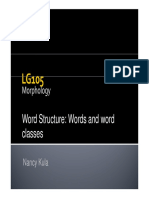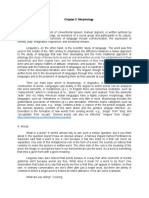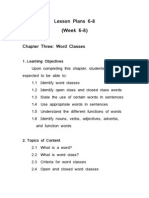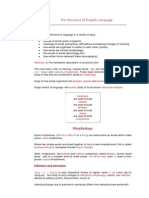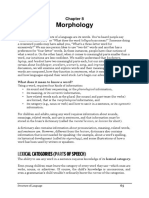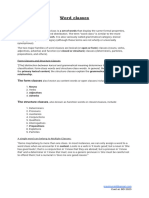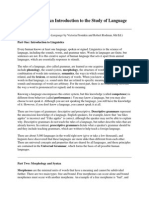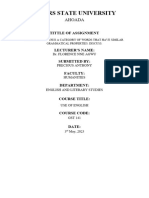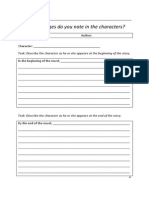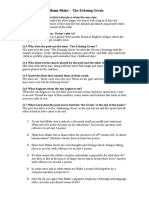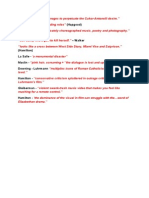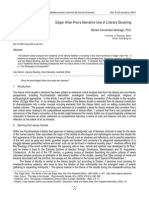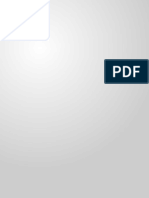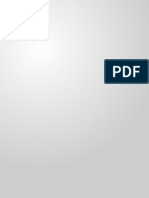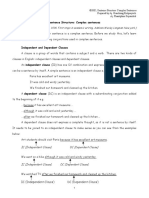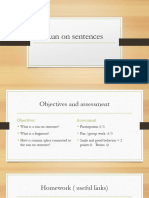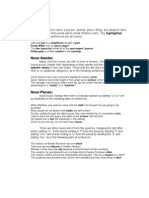Morphology
Word Structure: Words and word
classes
Nancyy Kula
� Class 8: Words & word classes ( Radford et al.
p125 139)
p125‐139)
Class 9: Building words (Radford et al. p140‐
Class 9: Building words (Radford et al. p140
155)
Class 10: Morphology across languages
( ad o d et a p 56 69)
(Radford et al. p156‐169)
Office hours (Rm 4 209): Tuesdays 15 17
Office hours (Rm 4.209): Tuesdays 15‐17
2
� What are words?
Classes of words
Lexical categories
Functional categories
Labelled bracketing
3
�A: where are you going?
B shopping
B: shopping
A: what for?
B: some socks
k
A: whareying?
B: shing
A. Whor?
B: smsks
4
� A word is the smallest free form found in a
language.
language
A free form is an element that
can occur in isolation
does not have an entirely fixed position
y p
e.g. the birds left
birds avoid cats
cats chase birds
5
�(1) A giergy has arrived.
Even if we do not know what giergy means
we can infer that we can have;
the giergy
h i
two giergies
every giergy
a yellow giergy
We do this because we assign giergy to a
word class.
word class
6
� Lexical words vs. function words
Lexical words denote concrete objects,
activities, ideas, events, states, properties, etc.
(Dictionary words with specific meanings)
Function words: words that fulfil a particular
function in a sentence (cannot easily be
u ct o a se te ce (ca ot eas y be
assigned a dictionary meaning)
7
�(2) John thinks that Bill has been visiting Mary
to ask for her help with the assignment which
must be finished by Friday.
Lexical words Function words
thinks
hi k that
h
visiting have been
askk to
Bill the
assignment
i t which
hi h
8
� cat house exercise
cat, house, exercise Noun
hit, sing, think
, g, Verb
red, tall, difficult Adjective
often, there, quickly Adverb
on through for
on, through, for P
Preposition
iti
9
� How do we assign words to classes?
By their meaning
By their morphological properties
By their distributional patterns
10
� Noun Things
Verb Actions
Adjective Properties
Adverb Manners,Times, Places,
Manners Times Places
Reasons, ...
P
Preposition
ii R l i ( on mat))
Relations (cat
11
� Non‐things as nouns:
idea, singing
, g g ((is fun), redness
),
Non‐actions as verbs:
remain, suffice, equal (2 + 2 = 4)
Non‐properties as adjectives
N ti dj ti
alleged (the alleged attacker), former (president),
the singing detective
12
� A given word may have several different
forms called inflected forms
forms, called inflected forms
For nouns, verbs and adjectives the set of
, j
inflected forms often help us identify the
word class
E.g. noun ‘cat’: singular cat, plural cats
13
� Plural form (only for count nouns, i.e.
nouns denoting things that can be counted
like cats, not mass terms such as water)
e cats, ot ass te s suc as ate )
cats, criteria, knives, teeth, sheep
How do we know that sheep is a plural
form?
14
� Four (regular verbs) or five forms (some irregular
verbs))
Regular verbs Irregular verbs
walk sing
walks g
sings
walking singing
walked sang
sung
15
� Comparative/Superlative forms
Meanings
more green Comparative
th
the most green
t S
Superlative
l ti
16
� The comparative and the superlative can be formed
by adding the endings ‐er
y g g or ‐est to adjectives as in
j
the following:
adjective comparative superlative
green
g greener
g greenest
g
happy happier happiest
17
�Adjectives: morphological properties
However, some adjectives do not take these
endings:
curious *curiouser
curiouser *curiousest
curiousest
foolish *foolisher *foolishest
But more curious, most curious
more foolish, most foolish
18
� Adverbs can often be recognized as being
derived from adjectives by adding ly
derived from adjectives by adding –ly
curiously, foolishly
But they don’t have any other regular forms
and are not inflected themselves
d i fl d h l
Prepositions don’t take any special form and
d k lf d
don’t inflect
19
� We have seen how Lexical words can be
categorised into classes in terms of meaning
and in terms of their morphological structure.
We now see how they can also be categorised
with respect to their distribution.
with respect to their distribution
20
�(3) The children are applauding a crazy clown.
Nouns
A noun is often preceded by a definite (the) or an
p y ( )
indefinite article (a/an).
Nouns can be modified by adjectives: crazy
y j y clown.
Nouns cannot be modified by adverbs: * foolishly
clown *clown foolishly
clown, *clown foolishly
21
� Verbs
Verbs can take nouns as complements or
arguments:
( ) Th it t l k
(4) The waiter stole a cake
Verbs are modified by adverbs;
y ;
(5) The waiter laughed foolishly
Verbs do not take articles; are not modified by
V b d t t k ti l t difi d b
adjectives
(6) * the steal ; *crazy stole
* the steal *cra stole
22
� Adjectives
Can be used with another adjective to modify a
C b d ith th dj ti t dif
noun; the crazy green clown
Unlike verbs: *steal applauding, or nouns.
An adjective can be used after a form of the verb
j
be to denote a property of a noun; John is happy
23
� Adverbs
An adverb typically modifies a verb indicating
A d b t i ll difi b i di ti
how, when or why something happened or the
d
degree of a property; carelessly
f t l l dropped.
d d
Like adjectives two can be used to modify a verb;
the audience applauded the clown very
enthusiastically.
y
24
� Thus when we hear a sentence we can identify
the word classes in it and label them as follows:
the word classes in it and label them as follows
(7) John called Bill on Friday evening.
(7) y g
[NJohn] [Vcalled] [NBill] [Pon] [NFriday]
[ADJevening]
(8) Bill laughed heartily
[NBill] [Vlaughed] [ADVheartily]
25
� We have identified the following major lexical
word classes:
word classes
j
Nouns Verbs Adjectives Adverbs and
Prepositions
We can identify them by their meaning, their
f
morphological properties
p g p p or their
distributional patterns.
26
� Function words can be differentiated from
lexical words because they are not content
words.
They have grammatical rather than lexical
meaning.
meaning
They usually don’t have referents.
They form a closed class.
27
� that, this demonstratives
and, but, or, as conjunctions
th /
the, a/an, every determiners
him, her, who pronouns
p o ou s
if, that, whether complementizers
can, will, must, have auxiliaries
28
� Can be identified by their distribution:
allow inversion in questions
May I go? Did John go? *Go John yesterday?
y g g y y
attract negation
John didn’t go. Mary will not eat. *John go not.
they can be emphasised (easily)
John did sing that song. ??John eats bread.
29
� Can be used as question tags
John came, didn’t he? John plays the violin,
J h did ’t h ? J h l th i li
doesn’t he? * John eats apples, eatsn’t he?
Can be used in gapping
A: John ate the apple
A: John ate the apple.
B: Yes he did
C: No he didn’t
C N h did ’
B: yes he did!
30
� Co‐occurrence of lexical & function
words
Words of a given major lexical class (N, V,
Adj ) will often be accompanied by
Adj,) will often be accompanied by
particular kinds of function words
l k d ff d
or lexical words
or phrases
31
�determiners (the, a, some, all, every, ...)
d
demonstratives
t ti (thi
(this man,...))
conjunctions
j ((Jack and Jill))
complementizers (If John comes...)
adjectives
dj i (the fluffy toy)
h fl ff
relative clauses (the girl that/who is wearing a
red coat)
32
�auxiliary verbs (may be being checked, will have
been checked)
pronouns (she gave him a hat)
adverbs (arrived now, came quickly, ...)
adverbial clauses (left when Jill arrived/because
she was bored...)
33
� modifiers too, very, more/most,
(tall) enough
comparative more intelligent than
ll h
phrases
p her brother
34
� We can now label more complicated sentences:
((9) John thinks that Bill has been visiting Mary to ask for
) J h hi k h Bill h b i i i M k f
her help with the assignment which must be finished by
F id
Friday.
[NJohn] [
] [Vthinks] [
] [COMPthat] [
] [NBill] [
] [AUXhas]
]
[AUXbeen] [Vvisiting] [NMary] [Pto] [Vask] [Pfor]
[PRNher] [Nhelp] [Pwith] [DETthe] [Nassignment]
[PRNwhich] [AUXmust] [AUXbe] [Vfinished] [Pby]
[NFriday].
Friday]
35
� Words can be divided into word classes.
We can broadly distinguish lexical from
W b dl di ti i h l i l f
function words.
The major word classes in lexical words are
, ,p p , j
nouns, verbs, prepositions, adjectives and
adverbs.
Word classes under function words include;
auxiliaries, determiners, demonstratives,
pronouns and conjunctions
pronouns and conjunctions.
36
� Read Radford et al. Chapter 9: Building words
(p162‐179)
37
